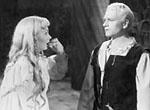KEN BRANAGH’S PUBLICIST might want you to believe differently, but the actor/director most responsible for setting the works of Shakespeare in the popular imagination was Laurence Olivier. In Henry V, Hamlet, and Richard III—let’s ignore his bizarre blacking- up for Othello—Olivier placed his individual stamp so heavily on these three dramatic figures that they’ve become the templates for all future treatments, theatrical or cinematic.
HAMLET
starring and directed by Laurence Olivier
runs January 28-February 3 at Egyptian
Interviewed late in life, Olivier revealed that two of the strongest artistic decisions he made in filming 1948’s Hamlet were basically accidental. After the gloriously chromatic treatment of his Henry V, the star got into a feud with the folks at Technicolor and peevishly decided to shoot his next film in black and white. As to dyeing his hair blond, this was a decision made not in the interests of historical authenticity (parts of the film were actually shot within the decaying walls of Elsinore Castle), but because he wanted to make sure his Prince was the focal interest of every scene. Ophelia—the lovely but underwhelming Jean Simmons—is apparently the only other blond in Denmark.
Production designer Robert Furse turns the stark, labyrinthine corridors of the castle into a metaphor for Hamlet’s own mind. One wonderful, vertiginous shot rushes up circling stairs to reveal the Prince poised on a precipice’s brink for “To be or not to be.” The film also contains what is no doubt the eeriest ghost in any Hamlet, a spectral, glowing-eyed creature wreathed in a perpetual mist.
Fifty years on, the Oedipal relationship between Gertrude (the overly affected Eileen Herlie) and Hamlet seems forced, but the company’s acting is surprisingly naturalistic, more so than many recent efforts. And unlike Branagh, Olivier understood the necessity of a good textual trimming. This restored print slips in under two and one-half hours, as opposed to Branagh’s four-hour 1996 Hamlet. With a few exceptions (such as the Hecuba speech), these cuts will only be missed by Shakespeare purists—who will nonetheless be forced to concede how they speed and clarify the play’s action.








